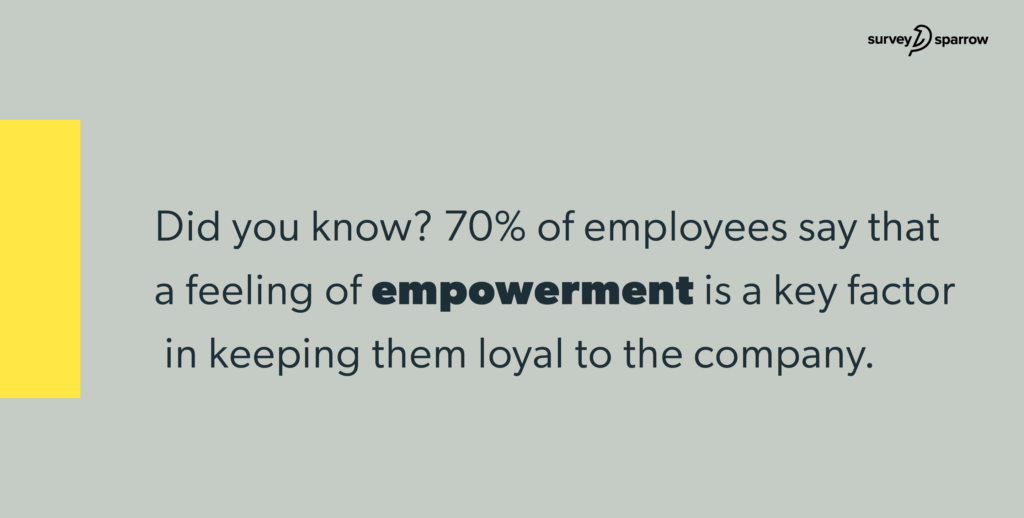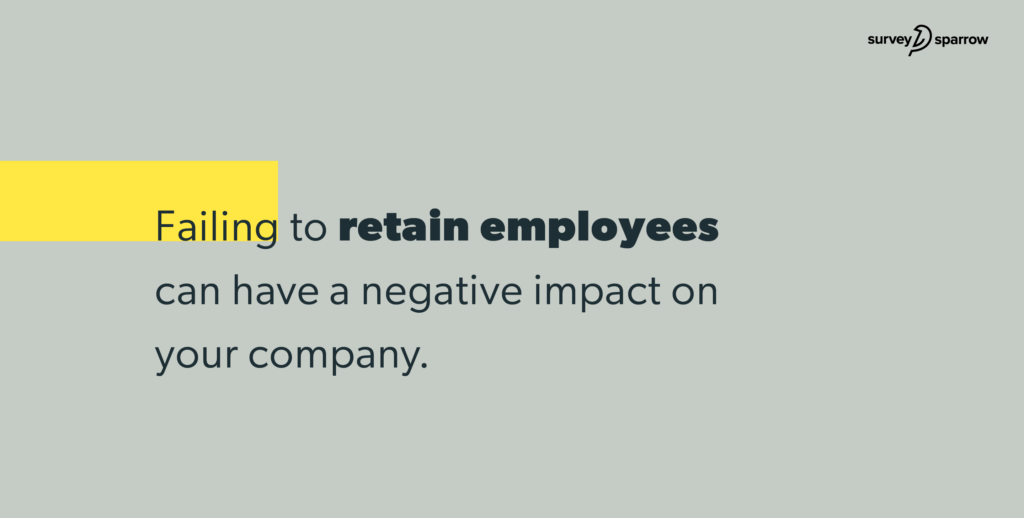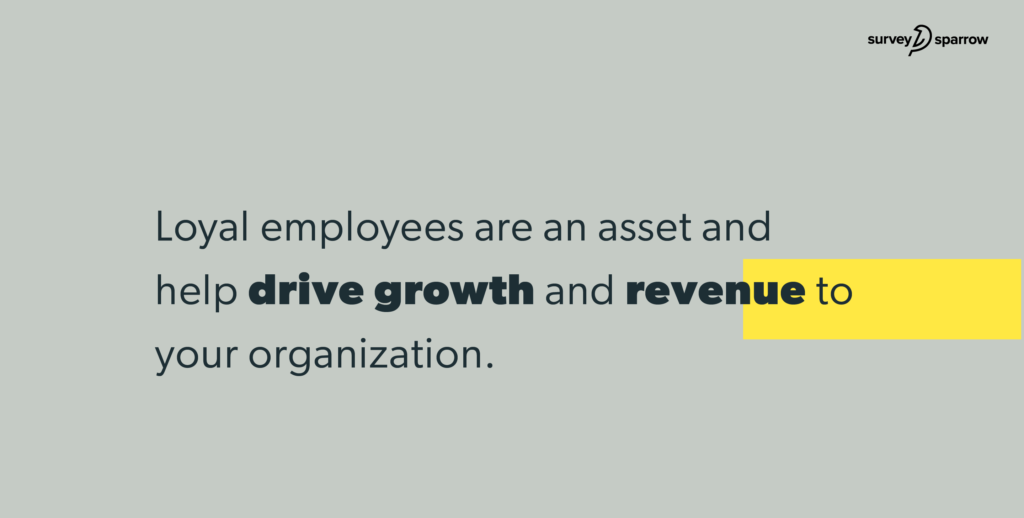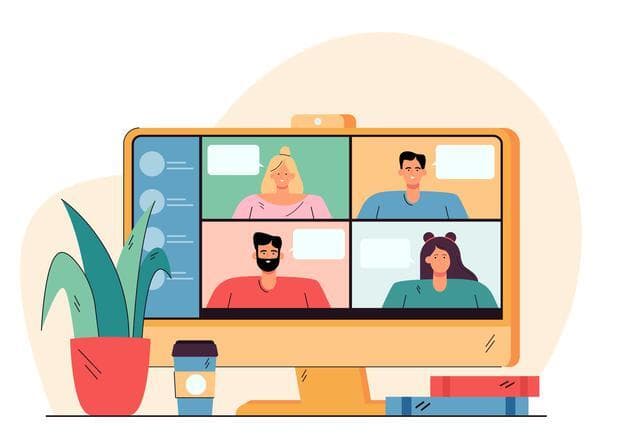All team managers will agree – retaining employee loyalty is one of the most crucial parts of the job.
Case in point: 87% of human resource managers say improving employee retention is a top priority for both long and short-term.
9 Simple Ways to Improve Employee Loyalty
You have every reason to keep your talented employees on board and growing, and every reason to not let them slip through your fingers. So, how can you do this? By prioritizing employee loyalty. And how do you improve employee loyalty? Let us show you how.
Here are 9 insanely simple ways to manage and improve loyalty at work.
- Align your employees with your organization’s vision
- Standardize and streamline your processes
- Enable your employees
- Empower your employees
- Provide flexibility to your employees
- Facilitate communication and collaboration
- Continually offer constructive feedback
- Provide opportunities for growth
- Recognize employees in ways that matter
1. Align your employees with your organization’s vision
The modern employee thrives on having a sense of purpose in their careers that go well beyond a paycheck.
While fair wages are important, your employees are also looking to get more intrinsic value from their experiences. In fact, a 2018 study by WeSpire found that employees belonging to Gen-Z typically prioritize purpose over salary when assessing a potential job.
There are two things to consider if you want to give this sense of purpose:
- First, you need to ensure their professional vision aligns with that of your organization. Basically, you want to know if your employees care about what your company aims to do for the industry and for the global community.
- You should also be sure that their ethical vision aligns with that of your organization. You stand a much better chance of retaining employees who share your company’s vision for social, environmental, and overall responsibility.
Aligning your employees with your company’s vision—and maintaining this alignment—is a process that involves:
- Communicating the importance of alignment in the first place.
- Collaboratively developing and enhancing your team’s vision.
- Maintaining constant contact and focus on your vision as time goes on.
2. Standardize and streamline your processes
As a manager, one of your key duties is to ensure your staff can complete their tasks in the most efficient and productive way possible. To set the stage for this, you’ll need to develop standard operating procedures and the relevant documentation.
Your organization’s SOP documents should include:
- Clear, concise, and comprehensive instructions for completing key tasks or processes.
- Information regarding who is responsible for specific tasks.
- Lists of resources to be used for said tasks.
You’ll want to allow your employees to have a say when developing your SOP. For one thing, that ensures the processes you develop are optimized for efficiency (since your on-ground team will know how to best approach the situation in question).
Moreover, involving your employees in this decision-making process will leave them feeling empowered. That will make them more likely to stay loyal to your company moving forward.
3. Enable your employees
For your employees to succeed in their tasks, and therefore gain purpose from their efforts, you need to enable them to work to their maximum potential. This involves:
- Identifying and removing blockers.
- Continually tweaking and optimizing workflows, and other processes.
- Consistently seeking out new tools and technology to maximize productivity.
- Fitting team members with tasks that best fit their skills, abilities, and knowledge.
Your dedicated employees want to put their best effort into everything they do. If for whatever reason, their hands are tied, it can lead to frustration, apathy, and even animosity toward your company. This, of course, isn’t helpful for retention.
But, by doing whatever’s needed to enable your employees, you’ll allow them to focus on their work at all times — keeping them engaged and loyal to your company in the process.
4. Empower your employees
Making your employees feel empowered is vital to keeping them on board.
In fact, 70% of employees say that a feeling of empowerment is a key factor in keeping them engaged and loyal. What’s more, 67% say they’re more willing to put in their best effort when their managers make them feel empowered.
More than just enabling your employees to efficiently do their assigned tasks, empowerment is about allowing them to go “all-in” in providing value. This involves:
- Giving them the autonomy they need to work to their full potential—even if it means “going off script” at times.
- Opening the door for collaboration and other teamwork efforts whenever needed.
- Soliciting—and actually heeding—any suggestions or advice they might have about certain aspects of their work and your company as a whole.
Show your employees they have the power to spur your organization to greatness. The feeling of being empowered will only increase employee loyalty.

5. Provide flexibility to your employees
Flexibility in the workplace has become a pretty hot topic — even more so during the global shutdown.
Across the board, 73% of employees say that flexibility adds to their overall job satisfaction, with 78% saying flexibility allows them to be more productive. This implies that these factors play a heavy role in job loyalty.
- There are two key areas in which employees typically look for flexibility: where they work, and when they work.
- The coronavirus shutdown led to millions of employees working from home. In some ways, the shutdown essentially forced employers’ hands. By today’s standards, many employees actually prefer to work from home — shutdown or not.
- Basically, if your employees can work remotely without sacrificing productivity, you need to enable them to do so.
- Time-wise, the modern employee appreciates being able to work when they’re at their most productive — not just during traditional business hours.
- If they can do better work in three off-hours than they would in an entire 9-5 workday, well…you’d better allow them to do so.
6. Facilitate communication and collaboration
Creating an organization that thrives on communication and collaboration is vital for employee loyalty and retention.
First of all, teams that communicate and work well together typically experience a number of benefits, such as:
- Higher productivity levels
- Better alignment and cohesiveness
- Less friction and fewer hangups
On a more personal level, collaboration can lead to valuable friendships—both within and outside the workplace. The better your teammates know each other, the better will be their collective work. And, of course, the fact that they enjoy each other’s company gives them even more reason to stay onboard.
As we’ve established, all of these things lead to higher levels of employee satisfaction—which, of course, has a major impact on loyalty.
Your employees should also feel comfortable communicating upwards whenever necessary. Whether it be to clarify certain instructions or make their voices heard; open lines of communication between you and your employees can make them more likely to stay on board.
7. Continually offer constructive feedback
Along with an open-door policy for employees who want to reach out, you also need to proactively and closely communicate with them. The reason being: it’s what the modern employee wants.
Case in point, a study found out that:
- 92% of employees prefer to be given formal feedback on their performance at least twice a year.
- 72% want to receive such feedback on a monthly basis.
- 49% thrive on weekly feedback from their supervisors.
Of course, this only applies to constructive feedback — which is exactly the type of feedback that keeps employees loyal.
Why is this the case? By providing laser-focused feedback on their day-to-day performance, you allow your team members to know what they’re doing well and where they need to improve.
On top of that, feedback provides recognition to your employees at a personal level. We’ll talk more about this in a moment. But for now, just know that employees who feel valued are much more likely to maintain loyalty to the company.
8. Provide opportunities for growth
Piggybacking off of the previous point, you can boost employee loyalty and retain top performers by giving them opportunities to grow.
According to LinkedIn’s 2018 Workplace Learning Report, 93% of employees said they would stay with a company that provided ongoing opportunities for growth. Conversely, 70% of employees cite “lack of professional development and career advancement opportunities” as a key reason for defecting.
Also, this is worth noting – when employees feel like their job duties are preparing them for career advancement, they are 20% more likely to still be with their company at least one more year.
There are a number of ways to provide growth opportunities to your employees, such as:
- Structured training and development sessions that lead to up-skilling; as well as certification and licensure in specific areas.
- On-demand knowledge sessions your employees can individually digest.
- Mentor/mentee sessions (or ongoing relationships).
- Knowledge cafes, and other collaborative brainstorming activities, to help with sharing tacit knowledge
- Simulated role-playing demonstrations.
Note that these professional development opportunities should also come with opportunities for career advancement – and all of the benefits in the form of promotions, raises, and the like.
It just makes sense. If your top performers employees know their efforts to grow will lead to better things professionally and personally, they’ll have no reason to look elsewhere for job fulfillment.
9. Recognize employees in ways that matter
An act of recognition can go a long way in solidifying employee loyalty. According to a report, 21.5% of employees who don’t feel appreciated by their firm had applied to, or interviewed for, new jobs within the last three months.
Backing this up, Gallup found that under-appreciated employees are two times more likely to quit within the second year.
Clearly, recognizing your employee for their efforts, and their ability to provide value, is key to keeping them around. But, the recognition you provide your employees must be on their terms. Above all, you don’t want to come off as being superficial or, worse yet, patronizing.
There’s really no “right way” to do this; it all depends on what your employees see as proper recognition. Consider using the Employee Incentive Questionnaire by SurveySparrow to ask about the rewards they prefer. You can customize and use it, and other features, with a free account.
14-day free trial • Cancel Anytime • No Credit Card Required • No Strings Attached
Sometimes, even a simple message pointing out the value an employee has added to the company can be enough to keep them motivated. But be it through intrinsic or extrinsic means, recognizing each member of your workforce is essential for improving employee loyalty.
Retaining your top employees is critical for a number of reasons:
- For one, your loyal, engaged, long-time employees are also likely to be the most talented. Their knowledge and skill, backed by years of experience, ensure they’ll be the most productive members of your team.
- What’s more, your loyal employees are likely to be those who shape your company culture and keep your team tight-knit.
- They have more experience with how (and why) your company operates. So they can help other team members stay focused on achieving the firm’s goals.
- Similarly, your long-time employees are a repository of knowledge, skills, and experience relating to your industry. Because of this, they can be an invaluable resource for training new employees, optimizing processes, and making other improvements within your organization.
Looking at all this another way – failure to retain your talent can lead to a number of bad outcomes. Needless to say, all of this will have a profoundly negative impact on your company.
- Gaps in productivity while you seek a replacement for the position, and get the new hire up to speed.
- Loss of any investments you’ve made in the former employee’s professional development.
- Loss of knowledge and expertise. If your ex-employee defects to a competitor, this will doubly hurt your organization.

Winding Up
If your employees don’t feel valued for the work they perform, they’re bound to start looking elsewhere for a company that appreciates them. So the need to prioritize employee loyalty cannot be stressed enough. We hope you will find the best practices for your organization in this guide and implement them.







